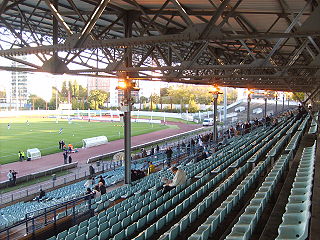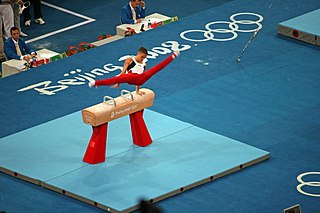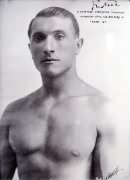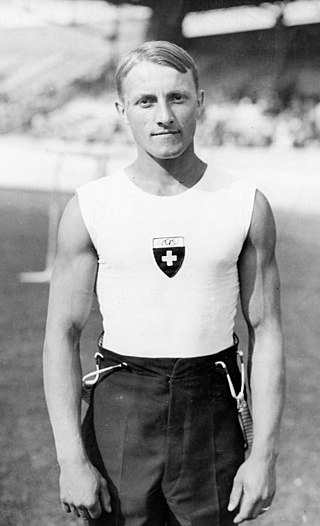
Gymnastics is a type of sport that includes physical exercises requiring balance, strength, flexibility, agility, coordination, artistry and endurance. The movements involved in gymnastics contribute to the development of the arms, legs, shoulders, back, chest, and abdominal muscle groups. Gymnastics evolved from exercises used by the ancient Greeks that included skills for mounting and dismounting a horse, and from circus performance skills.

At the 1904 Summer Olympics of St. Louis, Missouri, eleven gymnastics events were contested for the first time.

At the 1900 Summer Olympics one gymnastics event for men was contested. The competition was held on Sunday, 29 July 1900, and on Monday, 30 July 1900. There were 135 competitors from 8 nations. The top 18 places were taken by French gymnasts, of which there were more than 100. The event was won by Gustave Sandras, with Noël Bas finishing second and Lucien Démanet third. The highest-placing foreign gymnast was Jules Ducret of Switzerland, in a tie for 19th place.

Artistic gymnastics is a discipline of gymnastics in which athletes perform short routines on different types of apparatus. The sport is governed by the Fédération Internationale de Gymnastique (FIG), which assigns the Code of Points used to score performances and regulates all aspects of elite international competition. Within individual countries, gymnastics is regulated by national federations such as British Gymnastics and USA Gymnastics. Artistic gymnastics is a popular spectator sport at many competitions, including the Summer Olympic Games.

The men's individual all-around, also known as the heptathlon, was one of two gymnastics events on the Gymnastics at the 1908 Summer Olympics programme. As suggested by the alternate name, the competition included seven events with the scores summed to give a final score. Each nation could enter up to 20 gymnasts, with France and Great Britain each entering the maximum. A total of 97 gymnasts from 12 nations competed. The event was won by Alberto Braglia of Italy, the nation's first medal in the men's individual all-around. Silver went to Walter Tysall of Great Britain, the first medal for the nation as well. France's Louis Ségura earned bronze.

George Louis Eyser was a German-American gymnast who competed in the 1904 Summer Olympics, earning six medals in one day, including three gold and two silver medals. Eyser competed with a wooden prosthesis for a left leg, having lost his leg after being run over by a train. Despite his disability, he won gold in the vault, an event which then included a jump over a long horse without aid of a springboard.
Gymnastics at the 1956 Summer Olympics was represented by 15 events: 7 for women and 8 for men. All events were held at the West Melbourne Stadium between December 3 and December 7. It is located some 3.4 km north-west of the main Olympic venue, Melbourne Cricket Ground, and was renamed Festival Hall.
At the 1988 Summer Olympics, two different gymnastics disciplines were contested: artistic gymnastics and rhythmic gymnastics. The artistic gymnastics events were held at the Olympic Gymnastics Hall in Seoul from September 18 through 25th. The rhythmic gymnastics events were held at the same venue from September 28 through 30th.

The men's artistic individual all-around was an artistic gymnastics event held as part of the gymnastics programme at the 1904 Summer Olympics. It was the second time an all-around event was held at the Olympics. The competition was held on Friday, July 1, 1904 and on Saturday, July 2, 1904. One hundred and nineteen gymnasts from three nations competed. The event was won by Julius Lenhart, an Austrian gymnast living in the United States and competing under the auspices of his Philadelphia-based club. Silver went to Wilhelm Weber of Germany, with bronze to Adolf Spinnler of Switzerland. They were the first medals in the event for each of those nations, as France had swept the medals in 1900.

The men's individual all-around competition was one of eight events for male competitors in the artistic gymnastics discipline contested in the gymnastics at the 2004 Summer Olympics in Athens. The qualification and final rounds took place on August 14 and August 18 at the Olympic Indoor Hall. There were 98 competitors from 31 nations. Each nation could enter a team of 6 gymnasts or up to 2 individual gymnasts. The event was won by Paul Hamm of the United States, the nation's first victory in the men's all-around since the 1904 Games in St. Louis and second overall. It was the first medal of any color for an American in the men's all-around since the 1984 Games in Los Angeles. South Korea took two medals, a silver for Kim Dae-Eun and a bronze for Yang Tae Young. The scoring of the final was disputed; Olympedia calls this "the most controversial men's gymnastic event ever."

The men's artistic individual all-around was an artistic gymnastics event held as part of the gymnastics at the 1920 Summer Olympics programme. It was the fifth appearance of the event. The competition was held on Wednesday, 25 August 1920. 25 gymnasts from seven nations competed. Nations had been limited to 6 gymnasts each since 1912. The event was won by Giorgio Zampori of Italy, the nation's third consecutive victory in the men's individual all-around. France's Marco Torrès took silver and Jean Gounot earned bronze, stretching the French podium streak to three Games as well.

The men's parallel bars event was part of the gymnastics programme at the 1924 Summer Olympics. It was one of nine gymnastics events and it was contested for the third time after 1896 and 1904. The competition was held on Sunday, July 20, 1924. Seventy-two gymnasts from nine nations competed. The event was won by August Güttinger of Switzerland, the nation's first victory in the event. Robert Pražák of Czechoslovakia and Giorgio Zampori of Italy earned silver and bronze, respectively.

The men's pommel horse event was part of the gymnastics programme at the 1924 Summer Olympics. It was one of nine gymnastics events and it was contested for the third time after 1896 and 1904. The competition was held on Wednesday, July 23, 1924. Seventy gymnasts from nine nations competed, with each nation having an 8-gymnast team. The event was won by Josef Wilhelm of Switzerland, the nation's second victory in the event. With Swiss gymnasts Jean Gutweninger and Antoine Rebetez taking silver and bronze, respectively, it was the second consecutive appearance of the event in which the event's medals were swept.

The men's pommel horse competition at the 2008 Summer Olympics was held on August 17 at the Beijing National Indoor Stadium. The eight competitors with the highest scores in qualifying proceeded to the men's pommel horse finals. There, each gymnast performed again; the scores from the final round determined the final ranking. There were 76 competitors from 27 nations that competed on the pommel horse, with nations in the team event entering up to 5 gymnasts while other nations could enter up to 2. The event was won by Xiao Qin of China, the nation's second consecutive and third overall victory in the pommel horse. The other two medals went to nations that had never earned a medal in the event before: Filip Ude of Croatia took silver while Louis Smith of Great Britain finished with bronze.

The men's horizontal bar event was part of the gymnastics programme at the 1924 Summer Olympics. It was one of nine gymnastics events and it was contested for the third time after 1896 and 1904. The competition was held on Saturday, July 19, 1924. Seventy-two gymnasts from nine nations competed. The event was won by Leon Štukelj of Yugoslavia, with Jean Gutweninger of Switzerland taking silver and André Higelin of France bronze. It was the first medal in the horizontal bar for each of those nations.

The men's artistic individual all-around event was part of the gymnastics programme at the 1924 Summer Olympics. It was one of nine gymnastics events and it was contested for the sixth time. The competition was held from Thursday, 17 July 1924, to Wednesday, 23 July 1924. Seventy-two gymnasts from nine nations competed. Each nation could send up to 8 gymnasts, up from 6 in previous Games. For the first time since 1904, the scores for individual competitors were used to calculate a team score. The men's artistic individual all-around was won by Leon Štukelj of Yugoslavia. Czechoslovakia's Robert Pražák took silver, while Bedřich Šupčík earned bronze. Both nations were making their debut in the event.

The men's artistic individual all-around event was part of the gymnastics programme at the 1932 Summer Olympics. It was the eighth appearance of the event, which was established in 1900. The competition was held from Monday, August 8, 1932, to Wednesday, August 10, 1932. Twenty-four gymnasts from five nations competed. Each nation could enter a team of 5 gymnasts; Hungary sent only 4. The event was won by Romeo Neri of Italy, the nation's first victory in the event since 1920 and fourth overall. István Pelle of Hungary took silver and Heikki Savolainen of Finland earned bronze; it was the first medal in the event for each nation.

A perfect 10 is a score of 10.000 for a single routine in artistic gymnastics, which was once thought to be unattainable—particularly at the Olympic Games—under the code of points set by the International Gymnastics Federation (FIG). It is generally recognized that the first person to score a perfect 10 at the Olympic Games was Romanian Nadia Comăneci, at the 1976 Games in Montreal. Other women who accomplished this feat at the Olympics include Nellie Kim, also in 1976, Mary Lou Retton in 1984, Daniela Silivaș and Yelena Shushunova in 1988, Lu Li and Lavinia Miloșovici in 1992. The first man to score a perfect 10 is considered to be Alexander Dityatin, at the 1980 Olympics in Moscow.

The men's vault event was part of the gymnastics programme at the 1928 Summer Olympics held in Amsterdam. It was one of seven gymnastics events for men and it was contested for the fourth time after 1896, 1904, and 1924. Scores from the vault event were added to the results from other individual apparatus events to give aggregate scores for the individual and team all-around events. There were 85 competitors from 11 nations. Each nation had a team of 8 gymnasts; three of the 88 men did not start. The event was won by Eugen Mack of Switzerland, the nation's first victory in the event and first medal since 1896. Emanuel Löffler gave Czechoslovakia its second consecutive silver medal. Stane Derganc's bronze was Yugoslavia's first medal in the event.

The men's artistic individual all-around event was part of the gymnastics programme at the 1928 Summer Olympics. It was one of seven gymnastics events for men and was the seventh Olympic men's all-around gymnastic championship. Scores from the individual apparatus events were added to give aggregate scores for the individual all-around; individual all-around scores were similarly summed for the team all-around event. There were 88 competitors from 11 nations. Each nation sent a team of 8 gymnasts. The event was won by Georges Miez of Switzerland, with his countryman Hermann Hänggi taking silver. They were the first medals in the event for Swiss gymnasts since 1904 and the first gold medal ever for a Swiss man in the individual all-around. Defending Olympic champion Leon Štukelj of Yugoslavia finished with the bronze this time, making him the third man to win multiple medals in the event.














